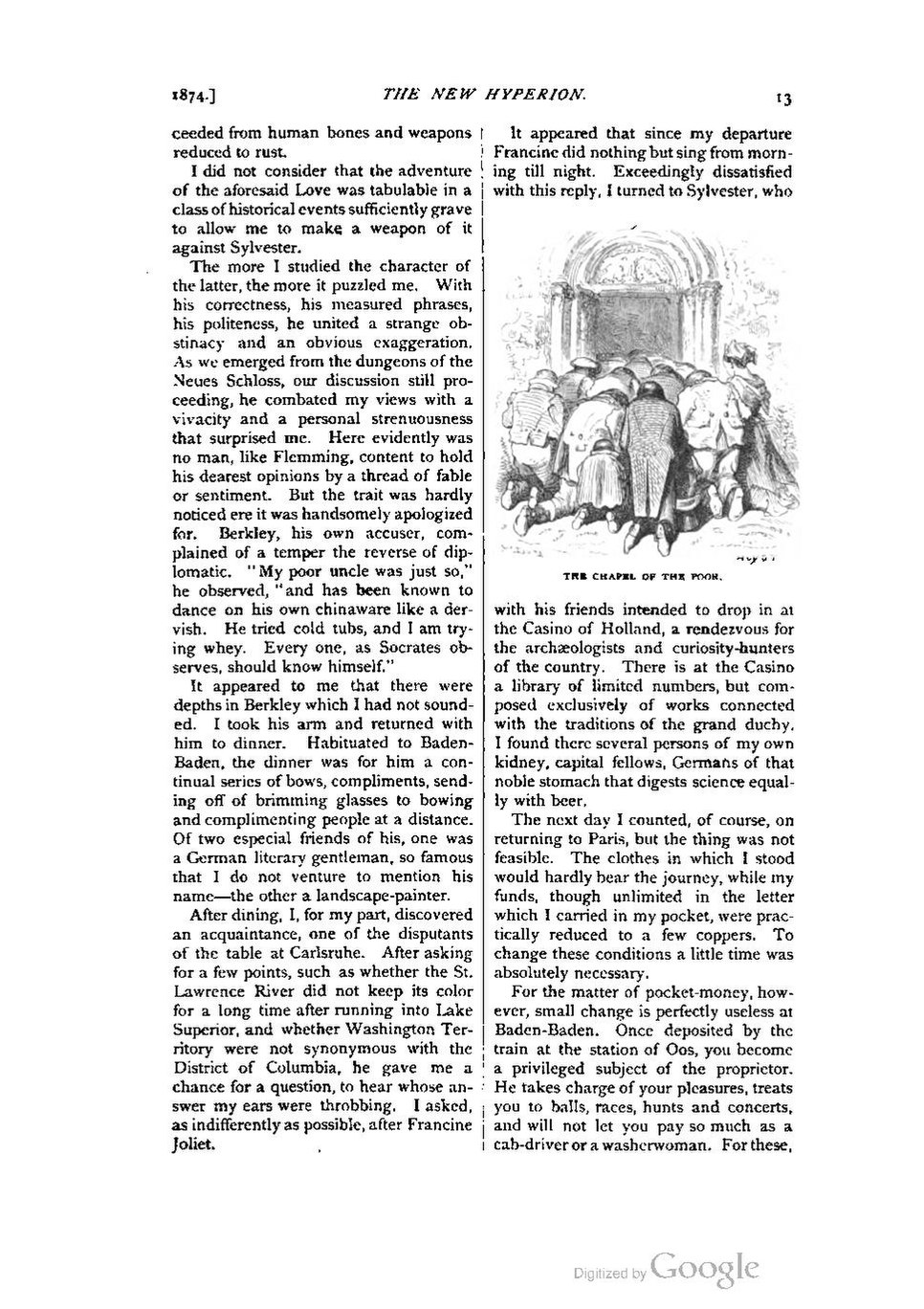ceeded from human bones and weapons reduced to rust.
I did not consider that the adventure of the aforesaid Love was tabulable in a class of historical events sufficiently grave to allow me to make a weapon of it against Sylvester.
The more I studied the character of the latter, the more it puzzled me. With his correctness, his measured phrases, his politeness, he united a strange obstinacy and an obvious exaggeration. As we emerged from the dungeons of the Neues Schloss, our discussion still proceeding, he combated my views with a vivacity and a personal strenuousness that surprised me. Here evidently was no man, like Flemming, content to hold his dearest opinions by a thread of fable or sentiment. But the trait was hardly noticed ere it was handsomely apologized for. Berkley, his own accuser, complained of a temper the reverse of diplomatic. "My poor uncle was just so," he observed, "and has been known to dance on his own chinaware like a dervish. He tried cold tubs, and I am trying whey. Every one, as Socrates observes, should know himself."
It appeared to me that there were depths in Berkley which I had not sounded. I took his arm and returned with him to dinner. Habituated to Baden-Baden, the dinner was for him a continual series of bows, compliments, sending off of brimming glasses to bowing and complimenting people at a distance. Of two especial friends of his, one was a German literary gentleman, so famous that I do not venture to mention his name—the other a landscape-painter.
After dining, I, for my part, discovered an acquaintance, one of the disputants of the table at Carlsruhe. After asking for a few points, such as whether the St. Lawrence River did not keep its color for a long time after running into Lake Superior, and whether Washington Territory were not synonymous with the District of Columbia, he gave me a chance for a question, to hear whose answer my ears were throbbing. I asked, as indifferently as possible, after Francine Joliet.
An image should appear at this position in the text. To use the entire page scan as a placeholder, edit this page and replace "{{missing image}}" with "{{raw image|Lippincotts Monthly Magazine-13.pdf/14}}". Otherwise, if you are able to provide the image then please do so. For guidance, see Wikisource:Image guidelines and Help:Adding images. |
THE CHAPEL OF THE POOR.
It appeared that since my departure Francine did nothing but sing from morning till night. Exceedingly dissatisfied with this reply, I turned to Sylvester, who with his friends intended to drop in at the Casino of Holland, a rendezvous for the archæologists and curiosity-hunters of the country. There is at the Casino a library of limited numbers, but composed exclusively of works connected with the traditions of the grand duchy. I found there several persons of my own kidney, capital fellows, Germans of that noble stomach that digests science equally with beer.
The next day I counted, of course, on returning to Paris, but the thing was not feasible. The clothes in which I stood would hardly bear the journey, while my funds, though unlimited in the letter which I carried in my pocket, were practically reduced to a few coppers. To change these conditions a little time was absolutely necessary.
For the matter of pocket-money, however, small change is perfectly useless at Baden-Baden. Once deposited by the train at the station of Oos, you become a privileged subject of the proprietor. He takes charge of your pleasures, treats you to balls, races, hunts and concerts, and will not let you pay so much as a cab-driver or a washerwoman. For these,
